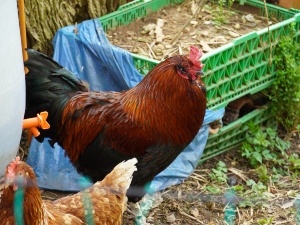
If you’ve been raising chickens for a while then you likely know that your chicken releasing anything other than brown poop with white urates on it means that there has been a change in your bird.
Pink poop coming from your chicken is something to look into, this article looks into why your bird is producing pink poop.
Table of Contents
Pink chicken poop:
Not only can a change in your bird’s appearance and behavior be a sign that there is something wrong with your bird, but a change in your bird’s droppings can mean that there is something wrong with your bird as well.
If your chicken is creating pink poop, possible reasons why this may be happening include:
Shedding of the intestinal lining:
Chickens will occasionally shed their intestinal lining. This shed intestinal lining will come out in the bird’s droppings. A chicken’s intestinal lining is constantly being worn away and a new lining replaces the old one.
Once the old lining is completely detached from the intestines, it will move through the bird, the bird’s body will digest the lining as though it is food and the bird will expel it in the bird’s feces making the bird’s poop look pink.
The bird is more likely to produce feces with a shed lining overnight.
What to do:
If this is what’s happening with your bird then you don’t have to do anything, this is a perfectly normal occurrence and you should not be alarmed if this happens.
Coccidiosis:
If your bird has pink poop then this may mean that there is blood in your bird’s poop, blood in your bird’s poop may mean that the bird has coccidiosis.
Coccidiosis develops when a parasite, called a protozoa, infects your bird, makes its way into your bird’s intestinal lining, attaches to the lining, and then damages the lining causing bleeding.
This disease is quite common in chickens and, it can be quite deadly as well. A bird that has this ailment will have blood or mucus in its poop and this may make the poop look pink.
In addition to your bird producing pink-colored poop, other signs of coccidiosis in your bird include a decrease in growth if your bird is still younger, a pale comb, pale skin, diarrhea, ruffled feathers, blood at the bird’s vent, and weight loss.
What to do:
You can assume that your bird has coccidiosis, but the only way to really be sure is if you take the bird to the vet to be examined and professionally diagnosed.
The vet will examine your bird and will do a fecal test on the bird to confirm the diagnosis. Once your vet is sure that this is what your bird has, then the vet will prescribe treatment if the ailment is caught early enough.
The vet will likely prescribe amprolium to your bird to treat this condition, this medication can be given to your bird in its water.
Amprolium is a quick-working medication, you will likely see improvements in your bird, like its droppings being free of blood, within 24 hours of first treating the bird.
Amprolium should be given for 7 days in total or according to your vet’s instruction.
You’d need to give the bird a vitamin B1 supplement after the round of Amprolium because this vitamin will be lost during the Amprolium treatment, Nutri-Drench can be given as a supplement.
Hardware disease:
Hardware disease isn’t a disease, but it is a serious condition that can affect your bird.
Chickens will forage and eat almost anything, these birds will eat shiny items like hooks, nails, earrings, spare change, and aluminum foil.
If your bird eats these items, then these items can poison the bird when the item breaks down and gets into its bloodstream.
The item may also lacerate the bird’s intestines and cause blood to come out with the bird’s droppings.
Blood in the bird’s droppings is what can make the bird’s blood pink. Pink droppings are one symptom of this condition, other symptoms of this condition include lethargy, droopy wings, vomiting, and dehydration
What to do:
You likely cannot remove the item out of your bird’s body yourself so it would be best to take your chicken to the vet. The vet will run blood tests on the bird and do x-rays looking for the metal piece and check whether it has broken up yet.
If the object has already been broken up, and is in the bird’s bloodstream, then giving the bird molasses will help to flush the toxins out of your bird’s blood.
Any items that haven’t been digested, and that the vet can’t access easily, may pass through the bird in its poop or may require surgery to remove.
Odd pieces of metal can come from a variety of sources so sweeping the areas that your chickens frequent on a regular basis will help keep these items from landing up in your bird’s mouth and body.
If you enjoyed this article then you may also be interested in other chicken related articles. Here are some articles that you may be interested in: Mustard Yellow Chicken Poop, Chicken Poop Clear Jelly, Baby Chick Eyes Stuck Shut, Baby Chick Not Opening Eyes, Signs A Baby Chick Is Dying


